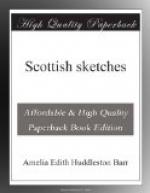He lifted the gold prepared for any such emergency, and, loosening his boat, pulled for life and death towards Mayness Isle. Once in the rapid “race” that divides it and Olla from the ocean, he knew no boat would dare to follow him. While yet a mile from it he saw that he was rapidly pursued by a four-oared boat. Now all his wild Norse nature asserted itself. He forgot everything but that he was eluding his pursuers, and as the chase grew hotter, closer, more exciting, his enthusiasm carried him far beyond all prudence.
He began to shout or chant to his wild efforts some old Norse death-song, and just as they gained on him he shot into the “race” and defied them. Oars were useless there, and they watched him fling them far away and stand up with outstretched arms in the little skiff. The waves tossed it hither and thither, the boiling, racing flood hurried it with terrific force towards the ocean. The tall, massive figure swayed like a reed in a tempest, and suddenly the half despairing, half defying song was lost in the roar of the bleak, green surges. All knew then what had happened.
“Let me die the death o’ the righteous,” murmured one old man, piously veiling his eyes with his bonnet; and then the boat turned and went silently back to Stromness.
Sandy Beg was in Kirkwall jail. He had made a clean breast of all his crimes, and measures were rapidly taken for John Sabay’s enlargement and justification. When he came out of prison Christine and Margaret were waiting for him, and it was to Margaret’s comfortable home he was taken to see his mother. “For we are ane household now, John,” she said tenderly, “an’ Christine an’ mother will ne’er leave me any mair.”
Sandy’s trial came on at the summer term. He was convicted on his own confession, and sentenced to suffer the penalty of his crime upon the spot where he stabbed Peter Fae. For some time he sulkily rejected all John’s efforts to mitigate his present condition, or to prepare him for his future. But at last the tender spot in his heart was found. John discovered his affection for his half-savage mother, and promised to provide for all her necessities.
“It’s only ta poun’ o’ taa, an’ ta bit cabin ta shelter her she’ll want at a’,” but the tears fell heavily on the red, hairy hands; “an’ she’ll na tell her fat ill outsent cam to puir Sandy.”
“Thou kens I will gie her a’ she needs, an’ if she chooses to come to Orkney—”
“Na, na, she wullna leave ta Hieland hills for naught at a’.”
“Then she shall hae a siller crown for every month o’ the year, Sandy.”
The poor, rude creature hardly knew how to say a “thanks;” but John saw it in his glistening eyes and heard it in the softly-muttered words, “She was ta only are tat e’er caret for Santy Beg.”
It was a solemn day in Stromness when he went to the gallows. The bells tolled backward, the stores were all closed, and there were prayers both in public and private for the dying criminal. But few dared to look upon the awful expiation, and John spent the hour in such deep communion with God and his own soul that its influence walked with him to the end of life.




